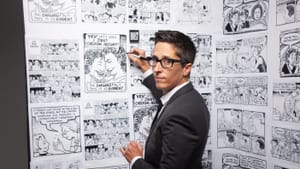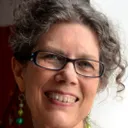Documenting the history and future of queer comics
PBS presents Vivian Kleiman’s No Straight Lines

No Straight Lines, director-producer Vivian Kleiman’s feature documentary premiering on PBS’s Independent Lens on January 23, is a delightful, immersive dive into the world of queer comics. It premiered at the Tribeca Film Festival in 2021 and went on to win various awards at dozens of US and international festivals. The film will stream on PBS until April 23 and then will be available for PBS members for three years.
The origin arc
The story begins with Mary Wings’s first lesbian comic book in 1973. Nurtured by the era’s burgeoning underground press, Wings and others rejected the message of R. Crumb’s misogynistic drawings that dominated the counterculture’s comics. But the 1954 Comics Code still controlled what could appear in mainstream publications: rules that, among other issues, banned portrayal of homosexual characters. As one of the film’s characters comments, this reinforced the prevailing vision of “what American life should be like.” Women’s bookstores, gay newspapers, and pioneering publishers became the lifeline for queer comics.
Four additional protagonists began their artistic careers during that period: African American artist Rupert Kinnard created the “Brown Bomber,” a whimsical superhero; Jennifer Camper, an Arab American cartoonist, describes how queer comic books covered AIDS—and in response to the dearth of outlets, she organized "cartoon jams" of artists' collaborations, as part of the movement of self-published zines and webcomics. Alison Bechdel’s Dykes to Watch Out For series formed the basis for her later autobiographical graphic memoir Fun Home which became the Tony Award-winning Broadway musical of the same name.
Howard Cruse was working as a magazine illustrator in New York when the Stonewall riots happened in 1969. “A fuse had been lit,” he said. “A civil rights battle had to be fought,” and his mission became to “represent a world that had gay people in it” through comic strips. He went on to edit Gay Comix and, later, inspired by Art Spiegelman’s Maus, created a graphic novel about growing up queer in Alabama at a time of violent racial injustice. Known as the “godfather of queer comics,” Cruse died in 2019; the film is dedicated to him.
Revolutionary panels
These five comic book icons form the core of the film, with their personal stories and shared commitment to, in Wings’s words, “show the real emotions and lives” of queer people and have the world “acknowledge them and take them seriously.” And as Bechdel says, “The fact that I could draw about my own queer life was revolutionary for me.”
Kleiman says she had been a fan, particularly of Bechdel’s work that appeared in a San Francisco feminist newspaper in the early 1980s. She got involved in the film when Justin Hall, a cartoonist, editor, and comic book publisher (later a producer on No Straight Lines), asked her to take over his own film on the subject. Kleiman went to a Comic Art convention as background research, where she met and filmed 15 or so young artists, who make cameo appearances in the film as inheritors of the legacy of the earlier pioneers. Kleiman decided to join the project then, captivated by the diversity and enthusiasm of the younger generation of queer cartoonists.
No Straight Lines is part comic-book-industry history; part instruction on the tools and process of drawing comics; and part revelation about how to create characters and drama through cartoons and text. By focusing on the LGBTQ comic book niche, the film makes a powerful political and cultural statement about inclusion, community, and human rights. But the film is anything but dull. The rich cinematography of Andrew Black contributes to a playful approach heightened by cartoon-inspired graphics. And the story often stretches beyond the queer community, showing universal situations of family and self-regard.
Kleiman grew up in an Orthodox Jewish home in the Mt. Airy neighborhood of Philadelphia. She graduated in 1968 from Girls’ High—“a phenomenal education”—and went on to study at Gratz College, a Hebrew teachers' school in Melrose Park. Kleiman feels these rigorous, diverse educational experiences, along with the wealth of Philadelphia’s cultural institutions, prepared her for her career, providing among other skills the precision necessary for the craft and aesthetics of filmmaking.
What, When, Where
No Straight Lines. Produced and directed by Vivian Kleiman. Available from January 23 to April 23, 2023, on PBS online and via local PBS television channels; then available exclusively for PBS members through 2026. nostraightlinesthefilm.com.
Sign up for our newsletter
All of the week's new articles, all in one place. Sign up for the free weekly BSR newsletters, and don't miss a conversation.

 Kathryn Smith Pyle
Kathryn Smith Pyle